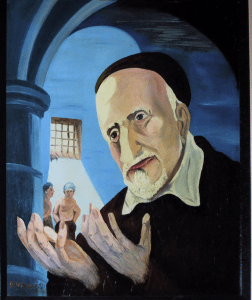 “Virtue is so beautiful and amiable that they will be compelled to love it in you, if you practice it well.”1
“Virtue is so beautiful and amiable that they will be compelled to love it in you, if you practice it well.”1
In the remarkable short letter from which this quote was taken, Vincent responds to news that several of the missionaries would be travelling on a ship with “some heretics.” After briefly expressing his distress at what they may have to “endure from them,” Vincent spends the rest of the letter reminding them that this is God’s plan. He encourages them to use their best manners and “be careful to avoid every sort of dispute and contention.”2 Vincent expresses hope that an example of beautiful character will be “helpful” to all.
Muslims are now entering into the final week of the observance of Ramadan. Ramadan is normally a month filled with fasting, prayer, and charity; it has been this year as well, although in all other ways it has been different with mosques closed and social activity curtailed by the pandemic. In a traditional saying of the Prophet Muhammad (which he sources to John the Baptist) it is said, “the similitude of the fasting person is that of someone who is carrying a sack-full of musk in a crowd of people—all of them marveling at its fragrance (although they can’t see what has created it).”3
The experience of long days of fasting and nights of sporadic sleep risks making one impatient or hard to be around. However, we find that when undertaken with intention and perseverance, a connection to a higher purpose along with increased gratitude and vulnerability reveals a beauty in the fasting person that is attractive to those around them even if they don’t know the source of it. Such a state also increases generosity that rains upon us all, even upon those who may be seen as heretics in a particular time or place.
During times of difficulty and anxiety like those we are living now, it is tempting to be less patient, less compassionate, more selfish, or even divisive with each other, particularly with those who hold differing worldviews.
What are some practices or exercises you can engage in to remain grounded in a sense of higher purpose? Is there a foundational belief or perspective which enables virtue to emanate from you, such that its beauty and fragrance is enjoyed by and helpful to all whom you encounter?
1) 3032, To Philippe Patte, In Nantes, [November or December 1659], CCD, 8:209.
2) Ibid.
3) Jami at-Tirmidhi, Kitab al-Amthal (Chapter of Parables), Book 44, Hadith 3102. See: http://sunnah.com/urn/630960
Reflection by:
Abdul-Malik Ryan
Assistant Director and Muslim Chaplain
Religious Diversity and Pastoral Care
Division of Mission and Ministry

